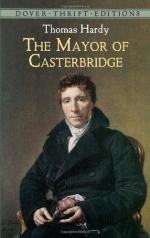Elizabeth-Jane’s bonnet and shawl were pitchforked on in a moment, and they went out. Among all the agriculturists gathered round the only appropriate possessor of the new machine seemed to be Lucetta, because she alone rivalled it in colour.
They examined it curiously; observing the rows of trumpet-shaped tubes one within the other, the little scoops, like revolving salt-spoons, which tossed the seed into the upper ends of the tubes that conducted it to the ground; till somebody said, “Good morning, Elizabeth-Jane.” She looked up, and there was her stepfather.
His greeting had been somewhat dry and thunderous, and Elizabeth-Jane, embarrassed out of her equanimity, stammered at random, “This is the lady I live with, father—Miss Templeman.”
Henchard put his hand to his hat, which he brought down with a great wave till it met his body at the knee. Miss Templeman bowed. “I am happy to become acquainted with you, Mr. Henchard,” she said. “This is a curious machine.”
“Yes,” Henchard replied; and he proceeded to explain it, and still more forcibly to ridicule it.
“Who brought it here?” said Lucetta.
“Oh, don’t ask me, ma’am!” said Henchard. “The thing—why ’tis impossible it should act. ’Twas brought here by one of our machinists on the recommendation of a jumped-up jackanapes of a fellow who thinks——” His eye caught Elizabeth-Jane’s imploring face, and he stopped, probably thinking that the suit might be progressing.
He turned to go away. Then something seemed to occur which his stepdaughter fancied must really be a hallucination of hers. A murmur apparently came from Henchard’s lips in which she detected the words, “You refused to see me!” reproachfully addressed to Lucetta. She could not believe that they had been uttered by her stepfather; unless, indeed, they might have been spoken to one of the yellow-gaitered farmers near them. Yet Lucetta seemed silent, and then all thought of the incident was dissipated by the humming of a song, which sounded as though from the interior of the machine. Henchard had by this time vanished into the market-house, and both the women glanced towards the corn-drill. They could see behind it the bent back of a man who was pushing his head into the internal works to master their simple secrets. The hummed song went on—
“’Tw—s
on a s—m—r aftern—n,
A wee be—re
the s—n w—nt d—n,
When Kitty wi’
a braw n—w g—wn
C—me ow’re
the h—lls to Gowrie.”
Elizabeth-Jane had apprehended the singer in a moment, and looked guilty of she did not know what. Lucetta next recognized him, and more mistress of herself said archly, “The ‘Lass of Gowrie’ from inside of a seed-drill—what a phenomenon!”
Satisfied at last with his investigation the young man stood upright, and met their eyes across the summit.
“We are looking at the wonderful new drill,” Miss Templeman said. “But practically it is a stupid thing—is it not?” she added, on the strength of Henchard’s information.




